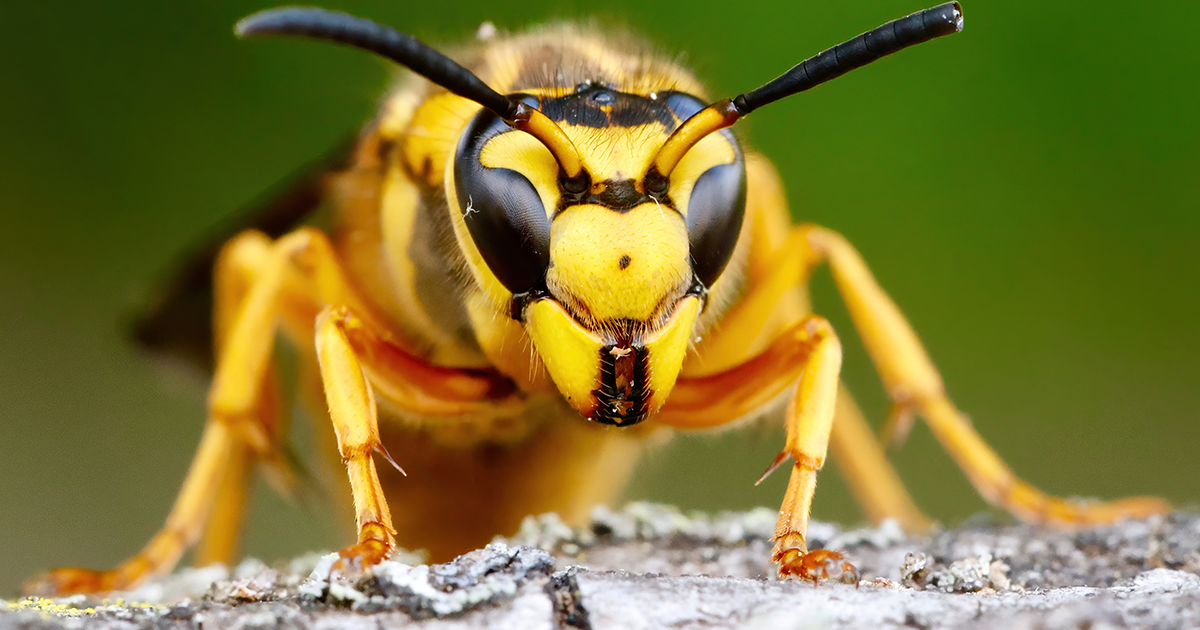
In Pennsylvania, wasps are most active during the summer months.
Like bees, hornets, and yellow jackets, wasps are equipped with a venom-filled stinger. While bee stings and wasp stings have similarities (like they can both cause allergic reactions), there are actually several key differences between them.
Keep reading to learn what a wasp sting looks like, how it differs from a bee sting, how to treat a wasp sting at home, and when to seek medical care!
Wasp stings usually feel like a sharp jab, followed by swelling, redness, itching, and/or heat where the sting occurred.
In a minor reaction to a wasp sting, the sting will look like a raised welt on your skin. It’s possible to see a small white mark in the middle of the welt, which is where the wasp’s stinger punctured the skin.
Mild to moderate reactions to a wasp sting will appear severely red and swollen and can last two or three days after the sting. You may also feel nauseous and experience vomiting. These symptoms occur because your body is allergic to the wasp venom and is having an allergic reaction.
Despite popular belief (or wishful thinking?), wasps do not die after they sting someone, leaving them free to sting you repeatedly. So, even if you don’t see a stinger in your skin, it’s still possible to have been stung by a wasp.
Think covering up will help? Think again. Wasps can sting you through clothing or gloves unless you’re wearing multiple layers.
Perhaps the greatest difference between bee stings and wasp stings is that bee stings are one-and-done. When a bee’s stinger latches into your skin, part of the bee’s digestive tract comes with it, leading to the bee’s demise.
Wasps, on the other hand, keep their stingers for their entire lives and can sting multiple people multiple times. Wasp stings can sometimes be more dangerous than bee stings simply because their venom can be more potent and lead to more severe health concerns.
Wasps are also far more aggressive than bees, who only sting when provoked. When wasps sting, they even release a pheromone that tells nearby wasps to come help them attack – instead of fighting off one wasp, you could end up getting stung by a whole hoard of them. Multiple wasp stings or an allergic reaction to wasp venom can lead to anaphylaxis or even death.
Most wasp stings clear up quickly, but the unpleasant aftereffects can last for days. The initial jabbing pain usually lasts only 1-2 hours, and any swelling, redness, and/or itching should peak about 48 hours after the sting. However, it may take up to a week to fully heal.
Wasp stings can get infected, so be sure to visit your nearest vybe urgent care if you have any sort of discharge at the sting site or your symptoms worsen over time.
If you’ve been stung by a wasp clean the sting site thoroughly with soap and water. To reduce swelling, place a cold ice pack on the sting site in 10-minute intervals (10 minutes on, 10 minutes off) for 30-60 minutes. When using an ice pack, always place a barrier (like a towel or piece of clothing) between the ice and the skin to avoid frostbite.
Over-the-counter antihistamines (Benadryl), pain relievers (Tylenol or Advil), and insect sting products can also help. If you’ve been prescribed an epi-pen for prior stings and severe reactions, make sure that it’s not expired and keep it handy when outside during the summer months.
If you’ve been previously stung by a wasp and didn’t experience a more intense reaction, it’s important to monitor for new or worsening symptoms, including generalized hives, trouble breathing, or swallowing.
Call 911 or head to the emergency room right away if you get stung in your mouth, nose, or throat. Any sign of a life-threatening allergic reaction also requires prompt medical treatment, such as:
Yes, wasp stings that cause mild to moderate allergic reactions can be treated at your nearest vybe urgent care! All vybe centers have licensed medical professionals with a wide range of healthcare knowledge, so we’re ready to help you get through wasp season and beyond.
vybe offers treatment for a wide range of insect and bug bites and many other urgent care services. Come find out what all the buzz is about – walk-in or schedule an appointment at your local vybe today.
FIND YOUR VYBE